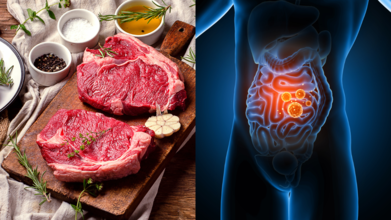- Health Conditions A-Z
- Health & Wellness
- Nutrition
- Fitness
- Health News
- Ayurveda
- Videos
- Medicine A-Z
- Parenting
- Web Stories
15 Low-Sodium Foods To Cut Down Excessive Salt Intake

Image credit: Canva
A low-sodium diet is one of the most important measures to control certain health disorders, such as high blood pressure, kidney disease, and heart-related diseases. It protects your heart and brings a variety of delicious menu options to your table. Generally, excessive sodium consumption raises blood pressure and increases the chances of heart diseases.
Given the fact that an average American takes over 3,300 milligrams of sodium a day and exceeds the limit of 2,300 milligrams of recommended sodium, it's high time to change your diet. Here is a comprehensive list of 16 low-sodium foods for healthy lifestyles and reducing excessive salt intake.
What is a Low-Sodium Diet?
Sodium is an essential mineral and plays a critical role in cellular function, electrolyte balance, and blood pressure regulation. Even though it is naturally present in many foods, processed and packaged items tend to be much higher in sodium. Avoiding these high-sodium foods and choosing fresh, wholesome ingredients is the key to a low-sodium diet.
These diets are highly recommended for patients who have blood pressure cases, kidney problems, or a heart disease case. In addition, following a low-sodium program is not only helpful to minimize health risks but also can develop healthy eating habits.
1. Fresh Fruits Instead of Canned
Canned vegetables have added salt to preserve them. For fresh produce or thoroughly rinse the canned vegetables, which cut down on sodium. Spinach, kale, and carrots are nutrient-dense with naturally low sodium.
Pro Tip: Honey garlic green beans is a tasty recipe for a low-sodium side dish.
2. Mushroom caps
Bread can be a hidden source of excessive sodium, especially when consumed in multiple slices. A great alternative is to swap bread for veggie options like ricotta-stuffed portobello mushrooms, which offer a low-sodium, nutrient-rich alternative reminiscent of open-faced sandwiches.
3. Homemade Soups Over Canned Soups
Canned soups are infamous for their high sodium content. Instead, prepare your own soups from fresh ingredients at home. The hearty, low-sodium chicken barley soup or a variety of vegetable soups are great options that can be prepared to your taste buds' liking.
4. Swiss Cheese Instead of Cheddar
Cheese can be a significant source of sodium, but Swiss cheese is the better alternative. Furthermore, creamy alternatives such as plain Greek yogurt or avocado can substitute for cheese in most recipes with minimal sodium content.
5. Popcorn instead of chips
When cravings strike, popcorn is a good substitute for salty chips. Sprinkle herbs or nutritional yeast over it for flavor without salt. Another low-sodium snack idea is ranch-seasoned popcorn.
6. Homemade Tomato Sauce
Pasta sauces in jars often hide sodium. Fresh tomatoes, garlic, and basil are the ingredients to make homemade tomato sauce, a healthier alternative that is quick to prepare for weeknights.
7. Potato Wedges Over French Fries
French fries, slathered with salt, can be a pitfall in your low-sodium diet. Try baking herbed potato wedges at home with little salt or go for veggie fries for a healthier alternative.
8. Grains Like Oats, Barley, and Quinoa
Whole grains contain less sodium and more nutrients. Compare the labels for packaged grains and try the no-sodium or low-sodium version. Make soups, salads, or breakfast bowls using oats, barley, or quinoa.
9. Low-Sodium Dairy Products
Use low-fat or non-fat milk, yogurt, and cheeses that have less sodium. Fresh mozzarella, ricotta, and goat cheese tend to be lower in sodium compared to processed cheeses.
10. Avocados and Healthy Fats
Avocados and olive oil are rich sources of healthy fats and are low in sodium naturally. Add them to salads, spreads, or cooking for flavor and texture.
11. Unsalty Nuts and Seeds
Do not go for the salty versions. Opt for unsalted almonds, pumpkin seeds, or peanuts. They can provide crunch with essential nutrients without any extra sodium.
12. Low-Sodium Soups
Whether they are canned or homemade, always choose low-sodium ones. Such soups save the day in case of urgent meals but ensure that sodium levels do not increase in the body.
13. Low-Sodium Bread and Baked Goods
Bread and tortillas can creep in high amounts of sodium. Look for whole-wheat varieties that are low-sodium. Top them with fresh ingredients for a healthy snack or meal base.
14. Non-Dairy Milk
Fortified with calcium, this is a great low-sodium alternative to traditional dairy. It's versatile and does well in cooking and baking.
15. Egg Whites
Egg whites are also an even lower-sodium alternative to whole eggs for those who want to reduce sodium even further but still desire high-protein meals. 16. Fresh Herbs and Spices Instead of salt, try fresh herbs and spices such as basil, oregano, and turmeric. They are great flavor enhancers that add health benefits without contributing to sodium intake. High-
Sodium Foods to Avoid
To keep within your sodium bounds, it is important to limit or avoid foods like:
- Canned goods preserved in salt or broth
- Processed meats such as sausages and hot dogs
- Instant noodles with salty flavor packets
- Salty snack foods such as chips and crackers
- Frozen dinners and ready-to-eat meals
- High-sodium condiments like soy sauce and MSG
A low-sodium diet is an attainable, healthful way to manage sodium while maintaining flavorful, nutritious foods. Use fresh, unprocessed ingredients and create homemade recipes to drastically cut sodium levels and safeguard overall health. From creamy Swiss cheese to crunchy unsalted nuts, there is no lack of flavor options. So go ahead and take charge of your health by using these low-sodium alternatives; you will enjoy the health benefits of a balanced, heart-friendly diet.
Intermittent Fasting For These Many Hours Could Ruin Your Heart Health

(Credit-Canva)
We know that the kind of food you eat has a big impact on your health, but what about the timing? Scientists are starting to discover that when you eat may be just as important. In the past, people naturally had periods of fasting when food was scarce. Intermittent fasting, or fasting diets, focus on limiting when you eat. While there are potential benefits of it, a new study has revealed it could lead us to have health issues as well.
A new study published in the journal Diabetes and Metabolic Syndrome suggests that following a daily eating window of less than eight hours—a form of intermittent fasting—could double the risk of death from cardiovascular disease. While many people use intermittent fasting for weight loss and other health benefits, this research indicates a potential hidden risk.
How Do Long Fasts Cause Heart Problems?
The study, which analyzed data from over 19,000 U.S. adults, found that those who ate for less than eight hours a day had a 135% higher risk of dying from heart and blood vessel diseases like heart attacks or strokes, compared to people who ate within a 12 to 14-hour window. The researchers, led by senior author Victor Wenze Zhong, found that this link held true across different racial, ethnic, and socioeconomic groups.
The study did not find a link between this eating pattern and a higher risk of death from cancer or other causes. However, Dr. Zhong urged caution, stating that there is currently no long-term evidence from human studies to support using a very short eating window for heart health or longevity.
Can Fasting Harm Our Health?
According to the National Institutes of Health, fasting can potentially harm your health, especially if done for long periods. The article notes that studies have found a higher risk of gallstones in people who fast for more than 16 to 18 hours a day. These individuals are also more likely to need surgery to have their gallbladder removed.
The text also strongly advises that certain people should avoid fasting altogether. This includes individuals with specific health conditions or those taking certain medications. The information emphasizes that more research is needed to fully understand the effects of fasting. It concludes with a warning to talk with a doctor before trying any fasting diet, especially those that are not based on research.
Is Intermittent Fasting Right for You?
While fasting may have health benefits, experts warn that we still have a lot to learn. Some studies have linked fasting for more than 16 hours a day to a higher risk of gallstones. However, many experts agree that a 12-hour eating window followed by a 12-hour fast is likely safe for most people and matches eating patterns seen in people with long lifespans.
If you are considering a fasting diet, it's essential to talk to your doctor first. People with certain health conditions or those on specific medications should not fast. And remember, what you eat still matters—even if you fast, you still need to make healthy food choices.
Not Drinking Enough Water Could Spike Your Stress Hormones, Study Warns

Credits: Canva
When you think of drinking too little water, you can imagine the headaches, drowsiness or the parched mouth signalling dehydration but recent research indicates something much more complicated may be at work in the body, and so to say your mom was right about it- drinking insufficient water could be quietly magnifying stress, paving the way for long-term illnesses.
A research article in the Journal of Applied Physiology found that those consuming less than 1.5 liters of fluid per day had a 50% greater increase in cortisol, the body's main stress hormone, in difficult situations than those who hydrated according to guidelines. The discovery moves the hydration debate away from dehydration exclusively and toward stress resilience—a consideration with far-reaching impacts on cardiovascular, metabolic, and mental well-being.
Cortisol is the stress-fighting hormone that assists the body in responding to stress, but when elevated too long, it creates more problems than it solves. Long-term high cortisol has been linked to heart disease, type 2 diabetes, obesity, depression, anxiety, and compromised immunity.
The researchers at Liverpool John Moores University wanted to know if mild dehydration could affect the way the body responds to pressure. They tested this by grouping healthy young adults into two groups:
Low fluid group: less than 1.5 liters a day
High fluid group: reaching or surpassing recommended standards (2 liters for women, 2.5 liters for men)
Both groups underwent a Trier Social Stress Test that consisted of a simulated job interview followed by quick succession mental math. While both groups were equally anxious and had elevated heart rates, the low-fluid group's cortisol levels jumped astronomically higher, indicating water consumption has a direct impact on stress reactivity.
How Hydration Controls Hormones?
To see why, we have to examine the water-regulation system in the body. When we become dehydrated, the brain causes the release of vasopressin, a hormone that instructs the kidneys to hold on to water. But vasopressin doesn't quit there. It also acts on the hypothalamus, the brain's stress center, triggering further release of cortisol.
This produces a twofold effect: while the body is preserving water to avoid dehydration, it also increases stress responses. For an individual with work deadline pressures, family responsibilities, or money worries, this increased stress reactivity might compound into long-term health issues.
A Real-World Experiment in Stress and Hydration
The trial model replicated daily stressors. Participants received only 10 minutes' preparation time before confronting interviewers in white coats in front of mock cameras, after which they received stern math problems. Saliva samples taken at baseline and after showed sharp contrasts: those who consumed less water on a consistent basis had darker urine, worse markers of hydration, and much stronger cortisol responses.
What is surprising is that the members of the low-fluid group didn't actually perceive themselves as thirstier than others. That means that even if they didn't have apparent dehydration symptoms, their bodies were still being stressed—a hidden vulnerability many of us may be missing.
The health effects reach beyond transient nerves. Chronically elevated cortisol can slowly increase blood pressure, interfere with blood sugar control, and weaken immunity. It might even lead to premature aging and lower stress resistance later on.
Indeed, it was recently reported by the British Heart Foundation that there was a disturbing increase in cardiovascular deaths among UK working-age adults—a trend predicted partly to be caused by stress and lifestyle. If stress hormone regulation is as much affected by hydration as these results indicate, it is possible that something as mundane as water consumption could be a factor in reversing this path.
How Much Water Is Enough?
Varying slightly from country to country, public health advice recommends:
Women: about 2 liters per day
Men: about 2.5 liters per day
This includes all fluids—water, tea, coffee, milk, and water-rich foods. Still, actual needs vary based on climate, physical activity, and health status. Pregnant and breastfeeding women, for example, often require more.
The easiest way to monitor hydration? Check urine color. Pale yellow typically indicates good hydration, while darker shades mean it’s time to drink more.
How To Use Hydration as a Stress-Management Tool?
We already understand that sleep, exercise, and diet define stress resilience. Hydration now has its place on that list. Drinking more water won't eliminate the pressures of life, but it can dull the body's physiological overreaction to them.
As Dr. Daniel Kashi, a study author, put it, "Though the low-fluid group did not say they felt thirstier, low hydration was obviously linked with higher cortisol reactivity. Over time, that hyper-responsiveness could add up to poor health in the long run."
The scientists are now investigating if increased water consumption in under-hydrated persons can decrease daily stress reactions—such as traffic jams, presentations, or impending deadlines.
Chronic stress has been termed a contemporary public health crisis, spurring everything from cardiovascular disease to mental illness. Most strategies for reducing stress such as meditation, therapy, or life redesign—take considerable time, expense, or infrastructure. Hydration, in contrast, is universal and within reach.
That does not translate to water being a panacea. The research was done under laboratory conditions and only with young, healthy adults. There is a need for more research to validate whether sufficient water can help alleviate stress-related medical issues in a wide range of populations and over many decades. Nevertheless, the potential for a low-cost, daily routine to alleviate stress is worthy of consideration.
With stress seeming inevitable in today's world, giving the body every possible advantage matters. Good health is seldom the result of a single sensational intervention but of constant, daily habits. Having a water bottle handy may be one of the smallest, most practical, and most powerful first steps toward resilience.
Beef, Pork, and Lamb Might Do More Than Fill You Up; Study Finds They Could Be Flaring Up Your Gut

Credits: Canva
Gaining weight by eating too many lamb chops or beef burgers is not the only risk. A new study published in Molecular Nutrition & Food Research suggests that red meat might be less of a comforting indulgence and more of a gut irritant. According to researchers at Capital Medical University in China, diets overloaded with pork, beef, or mutton could stoke inflammation inside the digestive system, potentially worsening gut-related disorders.
The Experiment
Scientists turned to an animal model. Mice were fed a diet high in red meat before being given a chemical that induces colitis, a condition that resembles inflammatory bowel disease (IBD) in humans. Results showed that the red-meat-fed mice experienced significant weight loss, shorter colons, and visible tissue damage. Their immune systems also went into overdrive, flooding the gut with inflammatory cells. Essentially, the study found that when the gut is already irritated, red meat makes the fire burn hotter.
All Red Meat Counts
Before you point fingers at beef or lamb individually, the researchers clarify that the issue is not with one specific type of red meat. The effect was observed across the board, whether it was pork, beef, or mutton. The common thread was the way red meat in general seemed to intensify inflammatory signals in the gut.
Gut Bugs in Trouble
One of the most striking findings was how red meat tampered with the gut microbiome—the trillions of tiny organisms that work quietly to regulate digestion and immunity. In the study, mice on red meat lost beneficial bacteria, particularly those that protect the gut lining and keep inflammation low. In their place, harmful microbes took over, making the digestive tract more vulnerable.
Why This Matters for Humans
While the experiment was done in mice, the implications for humans are worth paying attention to. People with conditions like Crohn’s disease or ulcerative colitis often report flare-ups after eating red meat. The study offers a possible explanation for this: the combination of heightened inflammation and a disrupted microbiome makes the gut more sensitive. For those already battling IBD, red meat might be less of a protein-packed friend and more of a troublemaker.
The Moderation Mantra
Does this mean you should swear off meat forever? Not necessarily. The researchers were clear that the study does not prove red meat directly causes IBD or that it should be completely eliminated from your plate. Instead, moderation seems to be the golden rule. If you do enjoy red meat, balance it out with plenty of fibre, fruits, vegetables, and lean proteins such as fish or chicken. A varied diet gives your gut a better chance of staying healthy and less inflamed.
Handle with Care
Red meat has long been under scrutiny for its links to heart disease and cancer risk, and now gut health joins the list of concerns. While more human studies are needed, the findings serve as a gentle nudge to reconsider how often you pile your plate with steak or kebabs. Your gut microbiome is like a delicate ecosystem. Treat it kindly, and it will return the favour.
© 2024 Bennett, Coleman & Company Limited

